| slideshare.net |
Literature searches are one of those skills that we assume students already have when they get into a PhD. As a consequence we rarely make time to explicitly teach the skills, so it’s probably not surprising that I meet many students who feel like they aren’t doing it ‘right’.
Many of these confused students are too afraid to ask for help from their supervisor. I think the fear comes from the feeling that you should know, even if you have never been properly taught.
This fear, by the way, is a good example of the effects of what my friend Dr Mary-Helen Ward would call the ‘hidden curriculum’ of the PhD. The hidden curriculum is created by the environment in which you are located and instills you with the norms and values of your academic culture.
Think about it: admitting incompetence is a loss of face and undermines your academic authority with your peers. Hence the fear of admitting you might not really know how to search the literature thoroughly or efficiently.
Lucky for those of you who are feeling this fear, there’s plenty of good, free advice about how to start searching the literature on the internet and many university libraries offer guides and courses.
The research training team at ANU curate these resources on social media have compiled a database with literally thousands of useful sites. These resources will get you off to a good start, but you can quickly find yourself stuck in mud. This is because most of this advice is in the form of context free lists of ‘dos and don’ts’ which are hard to operationalise in practice.
For instance, we all know that the first step in searching the literature is to type keywords into a database and get results, but how do you generate the keywords in the first place? Do you just … guess? Well - yes. Sort of.
As you have probably already found out, guessing will only get you so far. You have to be systematic about generating keywords - and creative at the same time. Not an easy ask. In fact, searching the literature involves a surprisingly sophisticated set of thought processes that take a long time to learn.
I’m going to outline one method of being systematically creative about how you search the literature. This is the way I do it, but there are probably as many ways as there are academics and I’ll be interested in what advice you might have to share in the comments.
If you can, start with your research concerns and questions. The example I’m going to use here is from a recent teaching trip to Indonesia and is documented in this slide deck. My research question is:
To what extent do safety concerns affect women’s transportation choices in large cities like Jakata?Let’s use a spider diagram to generate some sub-questions and broaden our search. Sub-questions are questions that would have to be answered as part of answering the larger question:
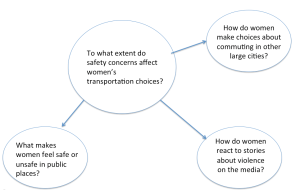
You might have noticed I work in threes when I use a spider diagram. This is a way of creating hierarchy and limiting the scope, so the task doesn’t become unmanageable. I’ve documented more about how to use this diagramming process in a downloadable cheat sheet here).
Let’s tackle one of the sub-questions. In the top right bubble is the question “How do women make choices about commuting in other large cities?” This is where I have to make my first educated guess. If the articles I was looking for were in a library, what would the label on the shelf say? Here’s what I came up with:
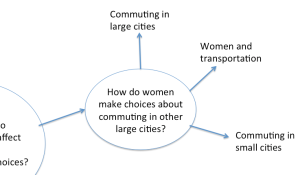
Now I have three topic areas: ‘commuting in large cities’, ‘women and transportation’ and ‘commuting in small cities’. Each of these topic descriptions has a different search purpose:
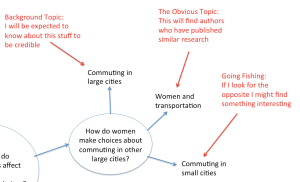
‘Commuting in large cities’ is what I call a background topic. If I type this in I’m likely to find literature I need to know to appear credible to other academics researching in this area. ‘Women and Transportation’ is an obvious topic. If I type these keywords in I will find researchers working in my immediate neighbourhood.
The final topic, ‘Commuting in small cities’, is what I call the going fishing topic. By deliberately inverting my search I might find something interesting - I’m not sure what yet. This is an example of deliberate systematic creativity in action.
I’m going to demonstrate using the Google scholar because everyone reading this blog will have access to that. Here’s what happens when I type in the obvious topic:
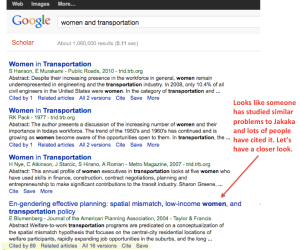
All the hits are relevant, as you might expect, but the last hit on the page looks most interesting “En-gendering effective planning: spatial mismatch, low income women and transportation policy”.
I’ve run a highlighter over the information Google gives me - most important is the number of citations. The number is quite high, which tells me people seem to have found the article useful.
Citation searches are one of the best ways of assessing the impact of a piece of literature in your area. Generally the more citations, the bigger the impact - but bear in mind you can be highly cited because everyone hates your work or because of other poor academic practices. But it’s a good enough reason as any to have a closer look:
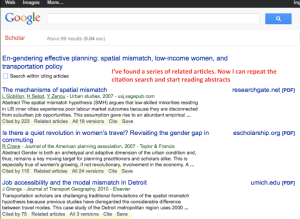
Paydirt! All the articles on the page seem useful to my imaginary project. I could keep looking, using the citations to guide me, but let’s go fishing now. Here’s what happens when I type in ‘commuting in small cities’ - the opposite of what I am studying:
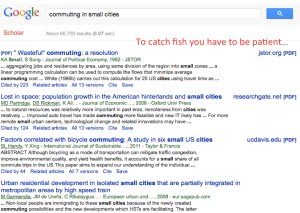
Strangely, the first hit looks pretty promising - the idea of ‘wasteful commuting’ is probably useful for my background reading. But let’s bookmark it and have a look further down the list. When you go fishing you have to be patient. On the second page I spot something even more interesting:
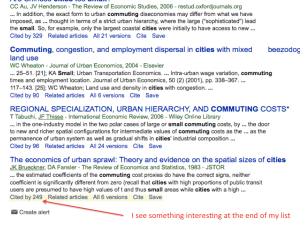
‘The economics of urban sprawl’ looks has a fair number of citations. Let’s take a closer look, who has cited this paper?
Third hit down is a literature review. A great find - hopefully this paper will contain a carefully curated list of literature and critical commentary. Why does searching for the opposite sometimes help us find exactly what we need? I’m not sure, but it never fails to turn up something interesting. Give it a try and see.
I could say so much more about searching the literature, but now I’m interested in what you think. Do you use any of the techniques I’ve described above, or do you have others to share? I’d be interested to hear about them in the comments.
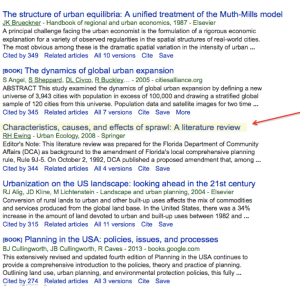
No comments:
Post a Comment